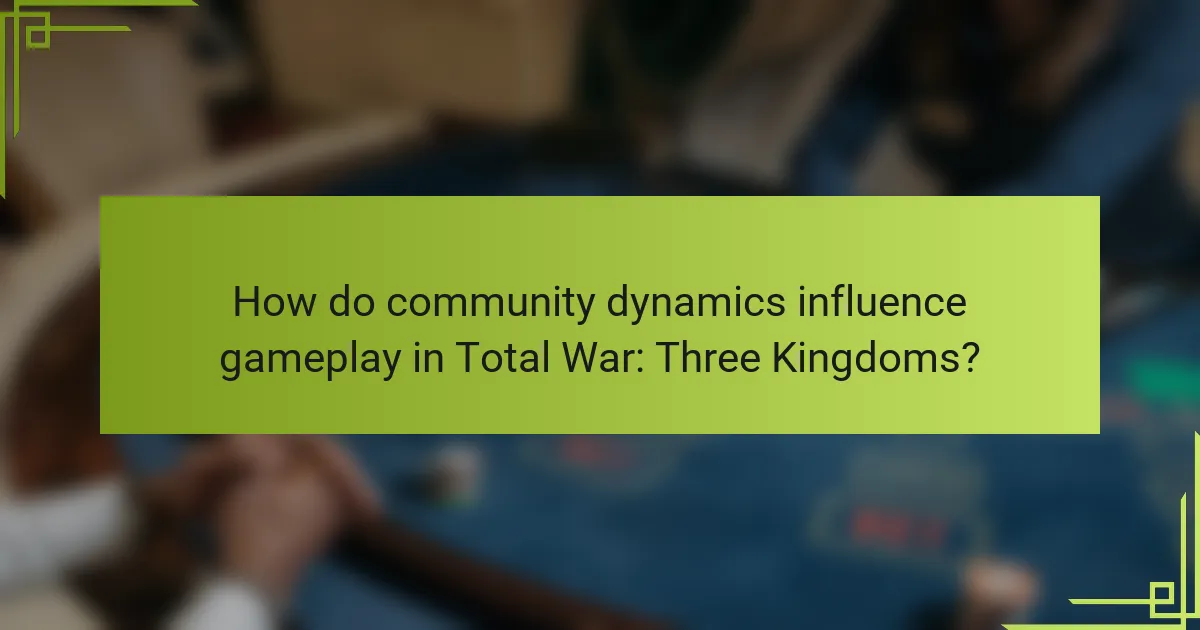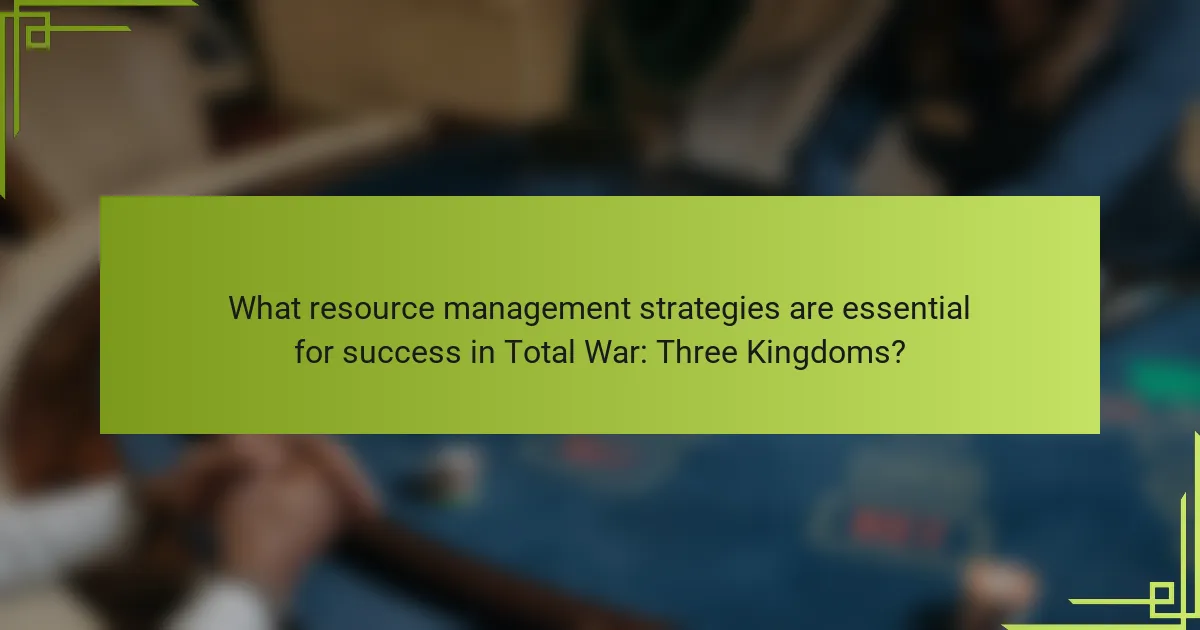Understanding community dynamics in Total War: Three Kingdoms is crucial for navigating alliances and resource management. Players face challenges in maintaining a sustainable economy and military readiness. Effective strategies include prioritizing food production, managing public order, and optimizing trade agreements. Additionally, leveraging diplomacy and adapting to changing community interactions can enhance resource acquisition and overall gameplay success.

How do community dynamics influence gameplay in Total War: Three Kingdoms?
Community dynamics significantly shape gameplay in Total War: Three Kingdoms by influencing alliances, resource management, and strategic decisions. Players must navigate complex relationships among factions, which can lead to shifting loyalties and betrayals. These dynamics affect resource allocation, as players often form coalitions to secure vital supplies and military support. The unique attribute of the game’s diplomacy system allows for varied interactions, enhancing the depth of strategy. As a result, understanding community dynamics becomes essential for effective gameplay and long-term success.
What roles do alliances and rivalries play within the community?
Alliances and rivalries significantly shape community dynamics in Total War: Three Kingdoms. Alliances provide strategic advantages, facilitating resource sharing and coordinated military efforts. Rivalries, on the other hand, create competition, driving players to improve their strategies and resource management. These interactions foster a dynamic environment where players must navigate complex relationships to achieve dominance. The presence of alliances often leads to temporary peace, allowing for resource accumulation, while rivalries can result in intense conflicts that test strategic capabilities. Ultimately, these elements contribute to a rich gameplay experience that emphasizes negotiation and tactical planning.
How do player interactions shape strategic decisions?
Player interactions significantly influence strategic decisions in Total War: Three Kingdoms. Players must adapt their tactics based on alliances, rivalries, and community dynamics. Engaging with other players can lead to resource sharing and cooperative strategies that enhance gameplay. Additionally, understanding the motivations and behaviors of opponents allows players to anticipate moves and counter effectively. This interaction shapes not only individual strategies but also the overall community approach to resource management and territorial control.
What impact do community events have on player engagement?
Community events significantly enhance player engagement in Total War: Three Kingdoms. They foster collaboration, competition, and social interaction among players, creating a vibrant atmosphere. Engaging events can lead to increased participation and retention, as players feel more connected to the community and the game. Unique attributes, such as themed tournaments or collaborative challenges, can further amplify excitement and investment in gameplay. As a result, these dynamics contribute to a more active and dedicated player base, enhancing the overall gaming experience.

What resource management strategies are essential for success in Total War: Three Kingdoms?
Effective resource management strategies in Total War: Three Kingdoms include prioritizing food production, managing public order, and optimizing trade agreements. These strategies ensure sustained growth and military readiness.
Food production is crucial; maintaining a surplus prevents starvation and supports troop replenishment. Balancing public order through infrastructure and policies mitigates rebellions. Trade agreements enhance resource acquisition and can provide critical funds for military campaigns.
Additionally, leveraging diplomacy can secure alliances that bolster resource access. Understanding the unique attributes of each faction helps tailor strategies effectively. For example, utilizing Liu Bei’s strengths in diplomacy can yield advantageous trade deals.
In summary, focusing on food, public order, trade, and diplomacy forms a robust framework for success in resource management within the game.
Which types of resources are most critical for different factions?
Resource types critical for different factions in Total War: Three Kingdoms include food, gold, manpower, and trade resources. Each faction prioritizes these resources based on their unique attributes and strategies.
1. Food: Essential for sustaining armies and population growth. Factions with agricultural advantages can thrive.
2. Gold: Crucial for diplomacy, recruitment, and infrastructure development. Wealthier factions can exert more influence.
3. Manpower: Determines the size of armies. Factions with strong recruitment capabilities can field larger forces.
4. Trade resources: Enhance economic stability and alliances. Factions focusing on trade can secure vital partnerships.
Understanding these resource dynamics helps players craft effective strategies tailored to their faction’s strengths.
How do players prioritize resource allocation during campaigns?
Players prioritize resource allocation during campaigns by focusing on strategic objectives and immediate needs. They assess their current situation, including troop strength and enemy actions, to determine the most effective use of resources. Key factors include securing food supplies, managing public order, and investing in infrastructure. Players often allocate resources to build armies or develop settlements based on their long-term goals and the dynamics of the battlefield. Effective prioritization leads to enhanced military capabilities and sustainable growth in the game.
What are the best practices for trading and diplomacy?
Effective trading and diplomacy in Total War: Three Kingdoms require strategic alliances and resource management. Prioritize building relationships with other factions to enhance trade opportunities. Utilize diplomacy to negotiate favorable terms, securing essential resources like food and gold. Leverage unique attributes of each faction, such as their strengths and weaknesses, to form beneficial alliances. Monitor the balance of power within the community, adjusting strategies accordingly to maintain influence and leverage. Understanding the rare attributes of factions can provide insights into potential betrayals or shifts in alliances, allowing for proactive measures.

Why do some factions excel in resource acquisition over others?
Factions excel in resource acquisition due to strategic alliances, efficient management, and unique advantages. Successful factions prioritize diplomacy and trade, leveraging relationships for resource access. They often utilize specialized units or technologies that enhance resource gathering. Additionally, adaptability to changing circumstances allows these factions to optimize their strategies effectively.
What unique abilities do certain factions possess?
Certain factions in Total War: Three Kingdoms possess unique abilities that enhance their strategic options. For instance, the Liu Bei faction excels in diplomacy, allowing for stronger alliances. The Cao Cao faction benefits from superior cavalry units, providing mobility advantages. The Sun Jian faction specializes in naval warfare, enhancing control over waterways. These unique traits influence gameplay and resource management, shaping community dynamics.
How does faction history affect resource strategies?
Faction history significantly influences resource strategies in Total War: Three Kingdoms. Historical alliances, conflicts, and legacies shape how factions prioritize resource allocation and management. For instance, factions with a legacy of strong military dominance may focus on resource strategies that enhance troop production and supply lines. Conversely, factions with a history of trade and diplomacy might prioritize economic development and resource acquisition. Understanding these historical contexts allows players to tailor their strategies effectively, leveraging their faction’s strengths while mitigating weaknesses. Historical narratives create unique attributes that can lead to rare resource opportunities, enhancing gameplay depth.

Which community-created resources enhance gameplay experience?
Community-created resources significantly enhance gameplay experience in Total War: Three Kingdoms. These resources include mods, guides, and community forums that provide strategies and insights.
Mods often introduce new mechanics, balance changes, or visual enhancements, enriching gameplay and replayability. Guides offer players tips on faction strengths, battle tactics, and economic management, improving strategic decision-making. Community forums serve as platforms for discussion, allowing players to share experiences and solutions to challenges.
The integration of these resources fosters a collaborative environment, where players can learn from each other and adapt their strategies. This dynamic enhances the overall enjoyment and depth of the game.
What are the most popular mods and their impacts?
The most popular mods for Total War: Three Kingdoms enhance gameplay by introducing new factions, mechanics, and balance adjustments. These mods significantly impact community dynamics and resource strategies.
Notable mods include “Radious Total War Mod,” which expands unit diversity and enhances AI behavior, leading to more engaging battles. “Divide et Impera” offers a complete overhaul, emphasizing historical accuracy and strategic depth, transforming resource management and military tactics.
“Realism Mod” adjusts unit stats and campaign mechanics, promoting a more challenging experience that influences player strategies. Lastly, “The Great War” mod shifts the setting, providing unique resource management challenges tied to its historical context. Each mod reshapes player interactions and strategies within the game.
How do guides and tutorials from the community shape player strategies?
Community guides and tutorials significantly influence player strategies in Total War: Three Kingdoms by sharing insights and tactics. Players benefit from diverse perspectives, enhancing their gameplay through collaborative learning. Community-generated content often highlights unique strategies, such as specific army compositions or resource management techniques. These shared experiences foster a dynamic environment where players can adapt and refine their approaches, leading to improved performance in competitive scenarios.

What challenges do players face in managing resources effectively?
Players in Total War: Three Kingdoms face challenges in resource management due to competition, limited availability, and strategic allocation. Effective resource management requires balancing military, economic, and diplomatic needs. Players often struggle with maintaining a sustainable economy while funding armies and managing public order. Additionally, fluctuating resource demands based on dynamic community interactions further complicate their strategies.
How do external factors influence resource availability?
External factors significantly impact resource availability in Total War: Three Kingdoms. Environmental conditions, political alliances, and economic stability dictate resource distribution and accessibility. For example, a drought can reduce food supplies, while strong alliances can enhance trade opportunities. Additionally, enemy actions can disrupt resource routes, affecting overall strategy. Understanding these dynamics helps players optimize their resource management and adapt to changing circumstances.
What common mistakes do players make in resource management?
Players often mismanage resources by overextending their armies, neglecting economic development, and failing to balance military and diplomatic strategies. Common mistakes include prioritizing conquest over infrastructure, leading to unsustainable growth. Additionally, ignoring the importance of trade agreements can limit resource acquisition. Lastly, players frequently underestimate the impact of public order on resource stability, resulting in rebellions that disrupt supply lines.

How can players optimize their resource strategies for competitive play?
Players can optimize their resource strategies by focusing on efficient management and strategic planning. Prioritize resource allocation based on your faction’s strengths and weaknesses. Utilize trade agreements to enhance income and bolster military supplies. Monitor enemy movements to adjust resource distribution effectively. Leverage diplomacy to secure alliances, which can provide additional resources. Employ scouts to gather intelligence on resource-rich territories, allowing for targeted expansions. Lastly, adapt your strategies based on the evolving dynamics of the community for sustained competitive advantage.
What expert tips can enhance resource management skills?
To enhance resource management skills in Total War: Three Kingdoms, players should focus on strategic planning and adaptability. Prioritize resource allocation based on immediate needs and long-term goals.
1. Analyze resource flow: Regularly assess the production and consumption of resources to optimize efficiency.
2. Balance military and economic investments: Ensure a strong economy while maintaining a capable military force.
3. Utilize diplomacy: Form alliances to secure resources and reduce conflict.
4. Adapt strategies: Be flexible in response to changing game dynamics and opponent strategies.
Which tools and software assist in strategic planning?
Total War: Three Kingdoms utilizes various tools and software for strategic planning. Key options include Total War’s in-game analytics, community forums for shared strategies, and external software like Excel for resource management. Additionally, modding tools enhance gameplay dynamics and allow for personalized strategy development. These resources collectively support players in optimizing their community dynamics and resource strategies.
What lessons can be learned from top players regarding resource strategies?
Top players in Total War: Three Kingdoms demonstrate effective resource strategies by prioritizing sustainable management and strategic allocation. They emphasize the importance of balancing military and economic investments to ensure long-term success.
Key lessons include the necessity of establishing strong trade networks to enhance resource flow, as well as the value of investing in infrastructure to support troop movements and logistics. Additionally, understanding regional resource availability allows players to optimize their armies and adapt to changing circumstances.
Top players often utilize diplomacy to secure alliances that bolster resource access, demonstrating that collaboration can be just as crucial as direct conflict. They also highlight the significance of monitoring enemy resource strategies to exploit weaknesses effectively.